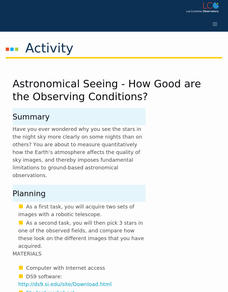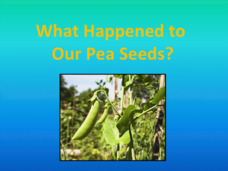Curated OER
Measurement and Variation
Examine the concept of variation through observation and measurement. Middle schoolers will study a peanut and record any distinguishing characteristics visible as well as sketch their peanuts and describe them in writing. Their peanut...
Curated OER
Summer Machines Activity: How Can We Move This Box of Blocks?
Students discover there's more than one way to move a heavy load. In this problem solving lesson, students use observation and problem-solving skills as they experiment with simple machines in order to transport loads.
Curated OER
Erupting Volcanoes!
Learners examine the causes of earthquakes, volcanoes, and floods, and explore how these events shape the surface of the earth. In this erupting volcanoes lesson, students create a volcano model of their own, make observations about how...
Baylor College
They're Everywhere: Bacteria
Totally gross out your class with the eighth lesson plan in this series on food science. Explore the microscopic world of bacteria by taking swabs of different classroom objects and growing colonies in petri dishes. An engaging activity...
Las Cumbres Observatory
Astronomical Seeing - How Good Are the Observing Conditions?
Why is star gazing easy on some nights and difficult on others? Pupils aim to quantify the answer in an enlightening astronomy lesson. After collecting images from an online robotic telescope, they measure the brightness of images using...
Curated OER
Field Guide to Schoolyard Insects and Their Relatives
Sometimes all you need to complete your perfect lesson plan is an awesome hands-on learning experience. Here is an extension activity that is sure to excite your learners. They'll head outside to observe the local insect community. When...
Curated OER
Observing the Pumpkin Cycle
Students observe and listen to nonfiction books about the life cycle of pumpkins. They practice early reading skills in a shared reading related to pumpkins. They observe the life cycle of a pumpkin including growth and decay.
Curated OER
Sky Observations Sky & Cloud Windows
Learners observe the sky and weather to gather data. They conduct experiments to answer questions about the sky and weather phenomena. They measure, analyze and present data. They create sky windows by gluing sky colored paint chips...
Curated OER
Investigate Science Using Crayfish
Young scientists discover the importance of scientific investigation by observing live crayfish. They carefully observe the patterns of crayfish in different environments. Then they discuss their conclusions and define what all living...
Curated OER
Lesson Plan: Sensory Exploration
Using their keen eyes and ears, learners build story observation skills which they will use to create sensory detail in their art. They note all of the things they observed on a walk, categorize them by sense, and then use the same skill...
Curated OER
From Light to Dark and Back
Experiment with light and dark in a series of interactive activities that lead up to reading and writing poetry. Class members have the opportunity to observe their feelings while sitting in the light and dark and to play with shadow...
Illustrative Mathematics
Sammy's Chipmunk and Squirrel Observations
Here is a fun project. Sammy observes a chipmunk and a squirrel to see how many holes each needs in order to stash the same number of acorns. Scholars could find the answer algebraically or create a table to analyze the problem in...
Nuffield Foundation
Observing Osmosis, Plasmolysis, and Turgor in Plant Cells
Create the perfect conditions for osmosis. Young scholars use a microscope to observe plant cells exposed to distilled water or sodium chloride. They observe how osmosis creates turgid or plasmolyzed cells.
Curated OER
Human Cheek Cell
Get up close and personal with human cells with this lab worksheet. Learners use a microscope to examine their own cheek cells, drawing diagrams of the cells and identifying the parts when they have focused in on a visible specimen....
Curated OER
Light Travels Through Objects
Learners experiment with materials that allow light to pass through. In this physical science lesson, students investigate the way light is absorbed by many different glass objects and household items. Learners write their descriptive...
Primary Resources
What Plants Need to Grow
What do seeds need in order to grow into plants? This presentation follows what happened every four days during a seed growth and observation study. Images compare how well two sets of seeds did under specific circumstances. Use this to...
Curated OER
Tomato Exploration
Create tomatoes in 15-20 minutes using this fun and interactive lesson plan! Learners listen to a book about tomatoes (recommendations listed), and focus on the vocabulary word tomato. They count the syllables and practice the plural....
Curated OER
Can You Bag It?
Put your class's observational skills to the test with a science experiment about paper and plastic bags. After reading some background knowledge about the materials in plastic grocery bags, third graders interpret a chart to answer a...
University of Wisconsin
Bimodel Botany Bouquet
Gardeners are given an individual plant specimen from a bouquet of local rain garden plants. They group up by their plant type and then make observations together, name the plant, and introduce it to the rest of the class. You then share...
Berkshire Museum
Backyard Rocks
You don't have to travel far to learn about rocks, just step outside, pick up a stone, and begin investigating. After taking a class walk around the school grounds collecting rocks, young scientists practice their skills of observation...
American Chemical Society
Investigating the Line
Note that this lesson is best paired with the preceding lesson in the unit. In that lesson, elementary physical scientists observed that the color coating of M&Ms® candies do not mix when dissolved off of the chocolate surface. Now...
Curated OER
Do You See What I See?
Students engage in a lesson that differentiates between right and wrong types of observations. In order to conduct the experiment they are provided with leaves and nameless objects with different designs. The two are compared and...
Curated OER
Observation vs. Inference
Student observe two cups, one slightly smaller and skinnier than the other, with one put inside the other. The cups are turned upside-down and the smaller one is caught as it falls out of the larger cup. The larger cup is filled up about...
Curated OER
Apple Observation
In this apple observation worksheet, students identify with the importance of observations and respond to the questions that follow the activity. They describe the image they see when they think of a red apple, including its texture and...
Other popular searches
- Observing Venus
- Observing Nature
- Observing the Night Sky
- Observing Simple Machines
- Observing Sensory Details
- Observing Protists
- Observing Trees
- Observing the Sky
- Observing Amoeba
- Observing Stars
- Observing Animals
- Observing Properties

























